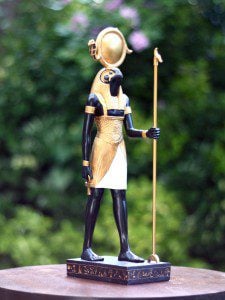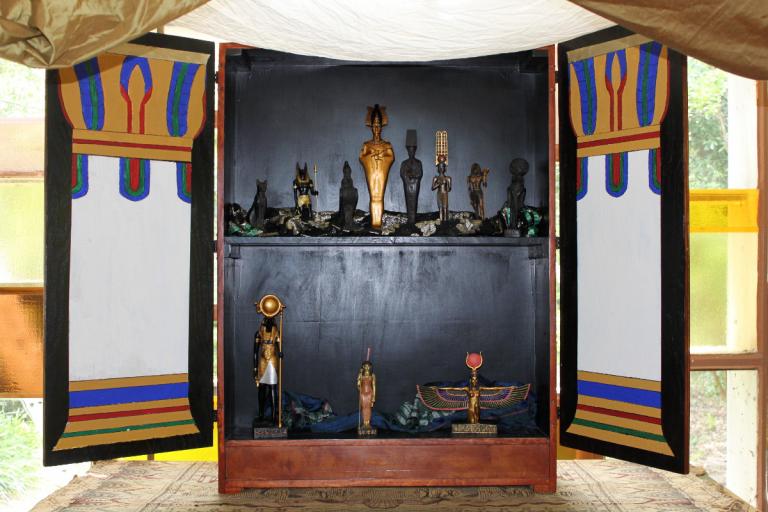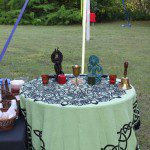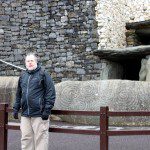 Presenting a UU Sunday Service on a Pagan topic is a challenge. How do we speak to the wide variety of people in attendance and still honor the traditions we represent? Most of the Sunday Services I lead look and feel like a “regular” UU service, just with Pagan themes.
Presenting a UU Sunday Service on a Pagan topic is a challenge. How do we speak to the wide variety of people in attendance and still honor the traditions we represent? Most of the Sunday Services I lead look and feel like a “regular” UU service, just with Pagan themes.
Today, Denton CUUPS tried something different – we did an abbreviated form of our Egyptian Daily Temple Ritual. Before that, we had three short “talky bits,” one on the history of Egypt (“Egypt: 4000 Years in 5 Minutes”), one on the essentials of religion as the Egyptians understood and practiced it (“A Living Religion”), and one on what it might mean to UUs living here and now.
The last part was mine. Here is “The Neteru in the 21st Century.”
* * * * * * * * *
We are not ancient Egyptians. Our food supply does not depend on the flooding of the Nile and despite what you may hear from certain politicians, our borders are not threatened by the Hittites or the Assyrians. Our scientific knowledge has grown tremendously over the past 2000 years, although if we think of the ancient Egyptians as primitive we both underestimate them and overestimate ourselves. Given all that, why would we look at ancient Egyptian religion as anything more than a historical curiosity?
There are two answers and they are not mutually exclusive.
The first reason we should care about ancient Egyptian religion is that the Neteru – the Goddesses and Gods of Egypt – represent the Universe of which we are a part. Ra is the Sun, Geb is the Earth, Nut is the Sky. Tefnut is moisture and Shu is the Air. Yes, the Sun is a ball of hydrogen gas in continuous nuclear fusion. It also provides us with warmth and light, sunrises and sunsets. Without the Sun there could be no life on Earth.
Do we appreciate the Sun? Are we thankful for the Sun? Are we even aware of the Sun, unless it’s in our eyes? It’s hard to have a relationship with a ball of hydrogen gas. It’s much easier to have a relationship with Ra.
These Gods and Goddesses represent some of the highest and most beneficial values and virtues known to humanity. Ma’at represents order and justice. Thoth represents learning and right choice. Anubis represents the final journey out of this world and into the next. Horus represents protection and the triumph of good over evil. Isis represents the love of a mother, the love of a spouse, wisdom and cunning, power and magic, and much more.
When we interact with these deities, whether in worship or simply in art and storytelling, we bring their virtues and values into our lives. We remind ourselves of what is good and right in the world, what is worth working for, what is helpful action – and what is not.
We’re constantly bombarded by appeals to our emotions by entertainment, politics, and advertising. These appeals are far more concerned with persuading us to give them money than with living according to our highest values. We need constant reinforcement. We need a few minutes each day to remind ourselves of what – and Who – is really important.
Some of us do this through mindfulness and other Buddhist practices. Some do it by following Jesus, or Moses, or Muhammad. And some of us do it by re-creating and re-imagining the ways of our ancient ancestors, including the ancient Egyptians.
And that brings us to the second reason why ancient Egyptian religion is more than a historical curiosity.
When we spend consistent, conscious time with anyone or anything we form a relationship with them. We have relationships with our friends and family and with our pets and plants. We have relationships with characters in our favorite books, and some of us have relationships with the books themselves.
When we spend time with the Gods, we form relationships with them. And as with all other relationships, the more time we put in, the deeper and more knowing the relationships become.
When CUUPS was getting ready to do our first Egyptian Summer Solstice ritual in 2004, we wanted to do a good job of preparing ourselves to perform it and present it to the public. So we spent nine nights in meditation – one night on each of nine Gods and Goddesses.
As I moved through the series of meditations, I found that my experience of Nut was different from my experience of Geb. My experience of Isis was different from my experience of Osiris, and both of those experiences were radically different from my experience of their brother Set. These experiences didn’t feel like different aspects of one great divine being – they felt like distinctly different beings.
19th century Victorians liked to paint a picture of “progress” from animism to polytheism to monotheism to the ultimate religion of Anglican Christianity. But is that really progress? The great diversity of religious experiences around the world point toward the diversity of the Divine. The world as we actually experience it is more easily explained by many Gods of limited power and scope than by one all-powerful God.
Ultimately, the true nature of the Divine remains as mysterious as ever. Each of us must conduct our own free and responsible search for truth and meaning. For some of us, that search has led us to the Gods of our ancestors, including the Gods of Egypt.


















